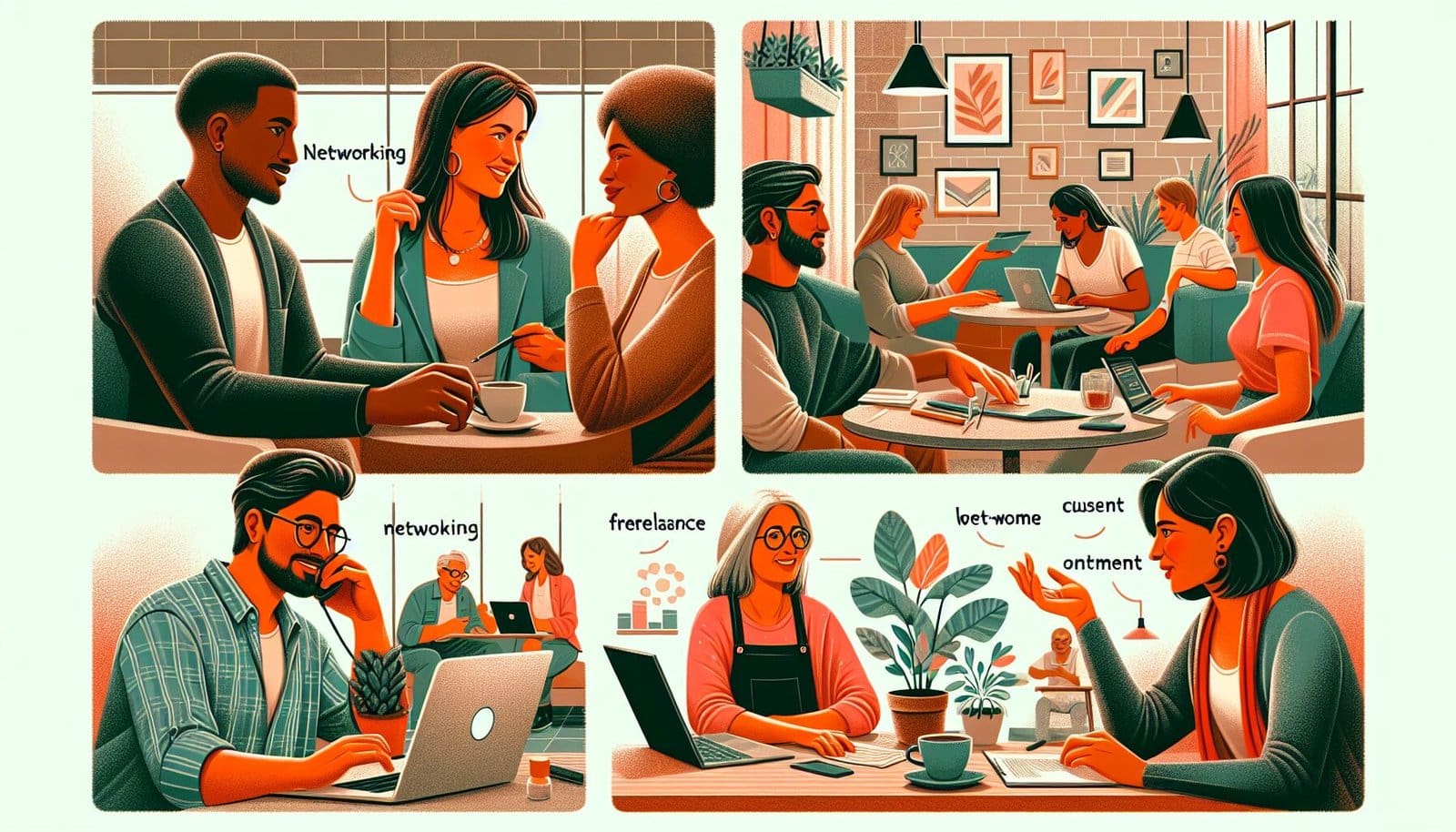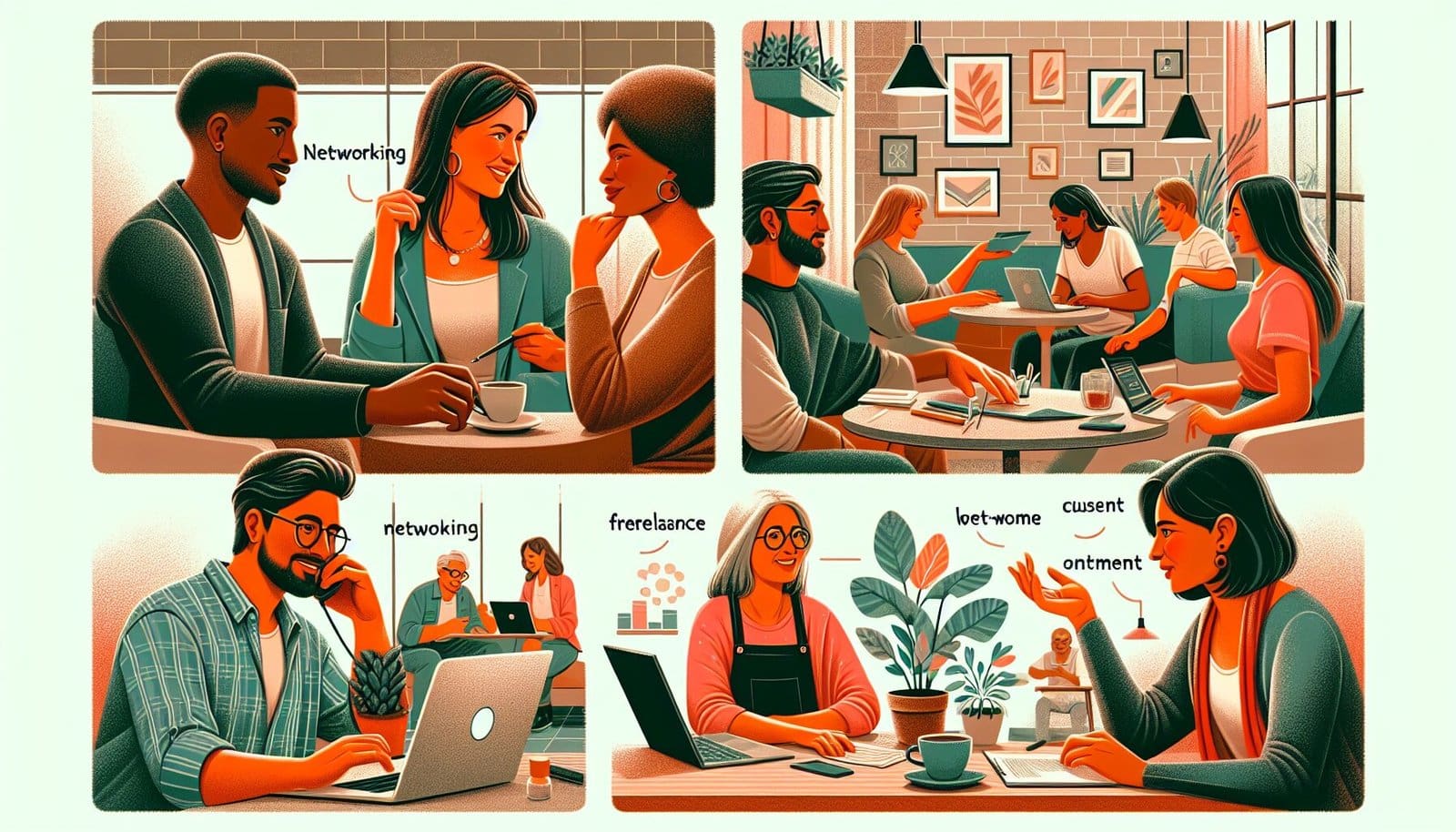Freelancers are always on the lookout for new clients, and one of the most effective ways to expand your clientele is through networking. Connecting with others in your industry or potential clients not only helps you forge valuable relationships but also opens the door to new opportunities. In this article, we will explore the power of networking and share some practical tips on how to build your freelance clientele through this essential practice. From attending industry events to leveraging social media platforms, find out how you can take your freelance career to the next level through the art of networking.
Building Your Freelance Clientele Through Networking
The Importance of Networking for Freelancers
As freelancers, we understand that our success depends on our ability to find and secure clients. Networking is an invaluable tool that allows us to connect with potential clients, establish relationships, and ultimately grow our freelance businesses. It provides us with the opportunity to showcase our skills, expand our professional network, and gain valuable insights and industry knowledge. Whether it's networking online or in person, building a strong client base requires an active and strategic approach to networking.
Preparing for Networking Events
Setting Goals and Objectives
Before diving into networking events, it's essential to set clear goals and objectives. What do we hope to achieve through networking? Are we looking to generate leads, gain industry insights, or simply expand our professional network? By defining our objectives, we can better tailor our networking efforts and maximize our results.
Researching the Event and Attendees
To make the most of networking events, it's crucial to research the event and attendees beforehand. Understanding the event's focus, agenda, and target audience will help us determine whether it aligns with our objectives and if it's worth our time and effort to attend. Additionally, researching the attendees allows us to identify potential clients, influencers, or industry leaders we want to connect with.
Crafting Your Elevator Pitch
One of the key elements of successful networking is having a compelling elevator pitch. It's a concise and engaging introduction that highlights our skills, expertise, and what sets us apart from other freelancers. Crafting an elevator pitch that clearly communicates our unique value proposition is vital in piquing the interest of potential clients and leaving a lasting impression.
Preparing Your Business Cards
Although networking has evolved significantly in the digital age, business cards remain an essential networking tool. They provide a tangible representation of our brand and contact information, allowing potential clients to easily follow up with us. When designing our business cards, it's crucial to ensure they reflect our brand identity and include relevant information such as our name, profession, and contact details.

MAKE 2024 THE YEAR OF FINANCIAL FREEDOM
Networking Online
Leveraging Social Media Platforms
Social media platforms provide numerous opportunities to network and showcase our freelance services. By actively engaging on platforms like LinkedIn, Twitter, and Facebook, we can connect with potential clients, industry peers, and thought leaders. Sharing relevant content, participating in discussions, and joining relevant groups can increase our visibility, establish our expertise, and attract potential clients.
Joining Freelance Communities and Forums
Joining online communities and forums specific to our industry or niche can be an excellent way to network with like-minded freelancers and potential clients. These platforms allow us to share insights, seek advice, and build relationships with professionals in our field. By actively participating, providing value, and helping others, we can position ourselves as knowledgeable and reliable freelancers, increasing our chances of attracting clients.
Participating in Webinars and Online Events
Webinars and online events are valuable networking opportunities that allow us to connect with industry experts, potential clients, and fellow freelancers. By attending and actively engaging in these virtual gatherings, we can learn from experts, demonstrate our expertise through questions and comments, and connect with potential clients who share similar interests or needs.
Networking in Person
Attending Industry Conferences and Trade Shows
Attending industry conferences and trade shows provides us with an excellent platform to network with potential clients, industry leaders, and other freelancers. These events usually attract professionals who are actively looking for services or seeking collaborations. By attending sessions, participating in Q&A sessions, and networking during breaks, we can make meaningful connections and establish ourselves as trusted professionals in our field.
Joining Professional Associations
Joining professional associations relevant to our industry is an effective way to network with other professionals and potential clients. These associations often organize networking events, workshops, and conferences specifically catered to freelancers and industry-specific topics. By actively participating in association activities, we can establish our credibility, expand our network, and gain access to exclusive opportunities.
Volunteering for Industry-related Events
Volunteering our time and skills for industry-related events not only allows us to give back to our community but also offers excellent networking opportunities. Volunteering positions us as dedicated professionals who are actively involved in the industry, increasing our chances of connecting with potential clients and industry leaders. It's an effective way to gain visibility, establish relationships, and demonstrate our expertise.
Hosting Workshops or Meetups
Hosting our own workshops or meetups is an excellent way to position ourselves as experts in our field and attract potential clients. By sharing our knowledge and offering value to others, we not only establish ourselves as credible professionals but also create a networking environment where potential clients can see our expertise firsthand. Additionally, hosting such events allows us to connect with other freelancers and industry professionals who may refer clients to us in the future.

Building Relationships with Existing Clients
Providing Outstanding Service
One of the best ways to build and expand our client base is by providing outstanding service to our existing clients. By consistently delivering high-quality work, meeting deadlines, and providing exceptional customer service, we increase the likelihood of receiving testimonials, referrals, and repeat business. Our existing clients can become our most powerful advocates and sources of new business.
Asking for Testimonials and Referrals
Once we have established a strong relationship with our existing clients, it's important to ask for testimonials and referrals. Testimonials provide social proof of our skills and professionalism, enhancing our credibility and attracting potential clients. Referrals, on the other hand, come from satisfied clients who recommend our services to their contacts, significantly increasing our chances of securing new clients.
Maintaining Regular Communication
Maintaining regular communication with our existing clients is essential for building strong relationships and staying top-of-mind. By checking in periodically, sending updates, and providing relevant industry insights, we demonstrate our commitment to their success and reinforce the value we bring. Regular communication also allows us to address any concerns promptly and maintain an open line of communication, improving client satisfaction and loyalty.
Expanding Your Network through Referrals
Cultivating Relationships with Like-minded Freelancers
Building relationships with other freelancers who offer complementary services or operate in the same industry can be highly beneficial. By referring clients to each other, we create a network of trusted professionals who can vouch for our expertise and actively send business our way. Cultivating relationships with freelancers who share similar values and work ethic can lead to long-term collaborations and a mutually beneficial network.
Building Partnerships with Complementary Service Providers
Collaborating with complementary service providers can open up new opportunities for networking and client referrals. For example, if we are a freelance graphic designer, partnering with freelance copywriters or web developers can allow us to offer comprehensive solutions to clients. By leveraging each other's networks and recommending each other's services, we significantly expand our reach and increase the likelihood of securing new clients.
Leveraging Your Network for Repeat Business
Staying Top-of-Mind with Regular Touchpoints
Even after completing a project, it's essential to stay top-of-mind with our network. By reaching out periodically, sharing updates, and offering valuable insights, we reinforce our expertise and remind clients of the value we bring. Regular touchpoints can lead to repeat business and referrals, as clients are more likely to remember us when they have a new project or know someone who needs our services.
Offering Exclusive Promotions or Discounts for Referrals
To further incentivize our network to refer clients to us, we can offer exclusive promotions or discounts. By providing added value to those who refer clients, we make the act of referring more appealing and increase the likelihood of receiving referrals. These exclusive promotions not only strengthen our existing relationships but also encourage our network to actively promote our services.
Utilizing Online Portfolios and LinkedIn
Creating an Impressive Online Portfolio
An online portfolio is a powerful tool for showcasing our previous work, skills, and expertise. By creating an impressive online portfolio, featuring our best projects and highlighting our strengths, we can attract potential clients and stand out from our competition. Including client testimonials, case studies, and project descriptions can provide further validation and insight into our capabilities.
Optimizing Your LinkedIn Profile for Networking
LinkedIn is a valuable platform for professional networking, making it crucial to optimize our profiles. A well-crafted LinkedIn profile can attract potential clients, showcase our skills and expertise, and help us connect with others in our industry. We should ensure our profile is complete, use relevant keywords in our headline and summary, and actively participate in professional groups and discussions to expand our network.
Following Up and Maintaining Connections
Sending Personalized Follow-up Emails
After making initial connections, it's essential to follow up with a personalized email. This email should express gratitude for the connection, reference any discussions or mutual interests, and propose potential next steps, such as a meeting or collaboration. A personalized follow-up email not only demonstrates our professionalism but also reinforces the connection and increases the likelihood of further engagement.
Connecting on Social Media
In addition to email follow-ups, connecting on social media platforms is another way to maintain connections and stay updated on the activities of our network. By connecting with individuals on platforms such as LinkedIn or Twitter, we can engage with their content, share insights, and build a stronger relationship. It's important to strike a balance between professional and personal interactions on social media, maintaining a friendly and approachable tone.
Nurturing Relationships with Regular Check-ins
Maintaining strong connections requires regular check-ins and nurturing the relationship over time. By periodically reaching out, sharing relevant updates, and showing genuine interest in our contacts' success, we can strengthen our professional relationships. Nurturing relationships through regular check-ins not only keeps us top-of-mind but also fosters a sense of trust and camaraderie, making it more likely for our network to recommend our services.
Continued Learning and Professional Development
Attending Workshops and Training Sessions
Networking goes hand in hand with continuous learning and professional development. Attending workshops and training sessions specific to our industry or skill set allows us to expand our knowledge, stay up-to-date with industry trends, and meet other professionals actively seeking to grow their freelance businesses. These events provide valuable networking opportunities while simultaneously improving our expertise and marketability.
Taking Online Courses or Certifications
Online courses or certifications offer flexibility and convenience while allowing us to gain new skills and broaden our professional horizons. By investing in our professional development through online courses, we not only enhance our capabilities but also demonstrate our commitment to staying relevant in an ever-changing industry. Opportunities for networking with instructors and fellow learners can further enhance the value of these courses.
In conclusion, building our freelance clientele through networking is an invaluable and necessary aspect of our freelancing journey. Whether we choose to network online or in person, it's important to be proactive, strategic, and authentic in our networking efforts. By setting goals, researching events, providing outstanding service to existing clients, leveraging referrals, optimizing our online presence, and continuously learning, we can expand our professional network, attract new clients, and ultimately build a successful freelance business.





